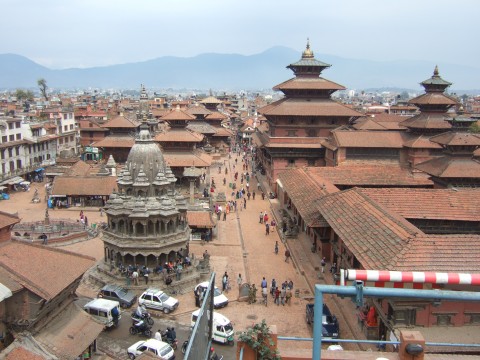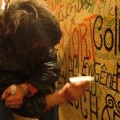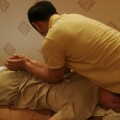I Had A Gun Pointed To My Head In Nepal
Staring at the barrels of a load of guns isn't quite how I thought my first day in Nepal would end. Yet here I am, on my motorbike, the engine idling, the smell of burning tyre filling the air. Eight guns levelled in my direction.

OK, Joe, I tell myself, smile, be polite, be English. Surely they won’t hurt you. One of the men approaches, his riot vest and reversed cap make him look like a baseball catcher. The glint of the setting sun on his pump-action shotgun changes the game.
“What are you doing here?” he asks.
Ten hours earlier, I’m riding into the sun, as it creeps above the haze enshrouding Mahendranegar, Nepal’s most western town. The street is busy yet quiet. No cars, no motorbikes, only bicycles. Kids laughing. Bells ringing. My old engine the only motor around. The evening before, I crossed the border from India. I’d spent two months there, exploring a country that often tried to kill, imprison, or drive me insane.
Nepal is a strip around 500 miles long and 150 miles wide. The south is flat plains called the Terai, north of there is the foothills, then the great Himalaya. My plan for the day is to cross half the Terai along the western section of the Mahendra highway, 250 miles of remote road. My target, a city named Butwal, where I’ll rest before heading into the mountains.
I chug along the silent carriageway, passing the odd military checkpoint. I cross national parks where the jungle flanks the highway. Families of macaques scamper across the potholed road that sometimes sinks away into dry riverbeds. Someone told me there’s a strike on, so there’s no buses, but I didn’t think it’d be this quiet. In the first 150 miles only a UN Jeep thunders by. It’s heaven after weeks of Indian motorway madness.
At a military outpost a soldier runs out to stop me. He speaks to me in broken English,
“Where you go today?”
“Butwal.”
“Listen, after here there may be people in road, maybe try stop you. You shouldn’t stop but if they make you stop, say to them you not Nepali and you going Kathmandu. Understand?”
“Err, not really. What kind of people? Soldiers?”
“Not soldiers. People.”
“Maoists?”
“No. Other people.”
“Other people?”
“Yes.”
“And I shouldn’t stop?”
“Yes.”
“Yes I should stop? Or yes I shouldn’t stop?”
“Yes you shouldn’t stop. But maybe they make you stop. Say you not Nepali, you go Kathmandu. Then everything OK.”
He smiles and waves as I ride off. I’m confused. Worried. What the hell was that about?
I begin to see burnt-out buses. Crumpled in on themselves like burning cans. Windows shattered in the heat. Tyres just chard stains on the ground. Luggage strewn around. One still burns and the hairs on my forearm singe as I pass. No person in sight.
Reaching a large town I cross a bridge and follow the road as it bends around a sharp curve into a narrow ravine. Then I see why there’s been no traffic. Supply trucks, fuel trucks, cars and minibuses straddle the road. Blocking the ravine at its narrowest point are two boulders, guarded by a group of men. Beyond them even more stranded traffic. I head towards the gap in the rocks. A couple of men approach. Thinking of the soldier’s words I twist the throttle and speed through. One of them tries to grab me. They shout as I ride away. The line of stranded vehicles goes on half a mile.
Towns become more frequent beyond the canyon. So do the blockades, where I’m waved through with no problem, sometimes stopped and asked where I’m from. If I’m alone. They’re friendly and inquisitive. But I sense tension and don’t like it.
I arrive at the outskirts of Butwal as the sun drops into my mirrors to the west. The streets are quiet. Eerie. I round a corner and see a burning car. A teenager runs out of an alley, followed by a policeman, in riot gear, waiving a long stick. He strikes the kid, hard. Who lets out a cry and legs it. The cop turns towards me. He stops as we look at one and other and I see the violence in his eyes. He’s young, eighteen or nineteen. He’s terrified. Exhausted. Sweat streams down his face.
“Where you from?” he asks, shaking.
“England. I just arrived in Nepal. What’s happening?”
“Strike. Curfew. Go! GO HOTEL!”
I’ve no hotel to go to, but accelerate away. I pass a few more burning cars and round a bend to find a large bridge crossing a wide, fast flowing river. Stood on the bridge in blue and black camouflage and riot gear are eight policemen. As I hit my brakes and slide in the gravel they all turn, sub-machine guns, pump-action shotguns and rifles levelled in my direction.
“What are you doing here?” asks the policeman, a finger resting on his trigger.
“I’m sorry, I’m a tourist, I just arrived in Nepal. I’ve come here by mistake.”
“DON’T YOU KNOW THERE’S A STRIKE?”
Here we go again. A strike? What kind of strike is this? This is more like a full blown civil meltdown.
“OK, OK, I talk to the boss.” he says, irritated, and walks over to a huge man with a gigantic chubby head.
“The boss says OK, you can go to your hotel, but go quickly and get off the street, there’s a curfew!”
“Is it safe to go on?”
“Yes. Maybe.”
Maybe?
Sweating like I’ve never sweat before, I ride past the group of armed men and cross the bridge. Every shop, house, door and window is shuttered closed. It feels like the apocalypse. Then, at the end of the street I see one, solitary door open. Above it a hotel sign.
My engine echoes from each building as I approach. I half expect zombies to attack. A man steps out to greet me. As we talk, a crowd of teenagers gather from the back streets. I hear a vehicle approach and the boy’s faces turn to terror. Everybody scatters. Streaming out of a pick-up truck come policemen with sticks and shields. They run in all directions, hitting whoever. I wheel the bike inside fast. The shutter slams behind me.
The Nepali government made changes one year before, giving seats to the Maoists after years of violence. They appear to be having some teething problems. According to the hotel guy, a week before in nearby Lumbini province, a policeman killed a student at a rally. A few days later the policeman was butchered. Chaos has struck. The whole population of the Terai is on strike.
If you like it, Pass it on
 COMMENTS
COMMENTS
other than that how was the view?
Oh well can't please em all. Thanks for reading all the same.


 RELATED
RELATED





 SABOTAGE
SABOTAGE



